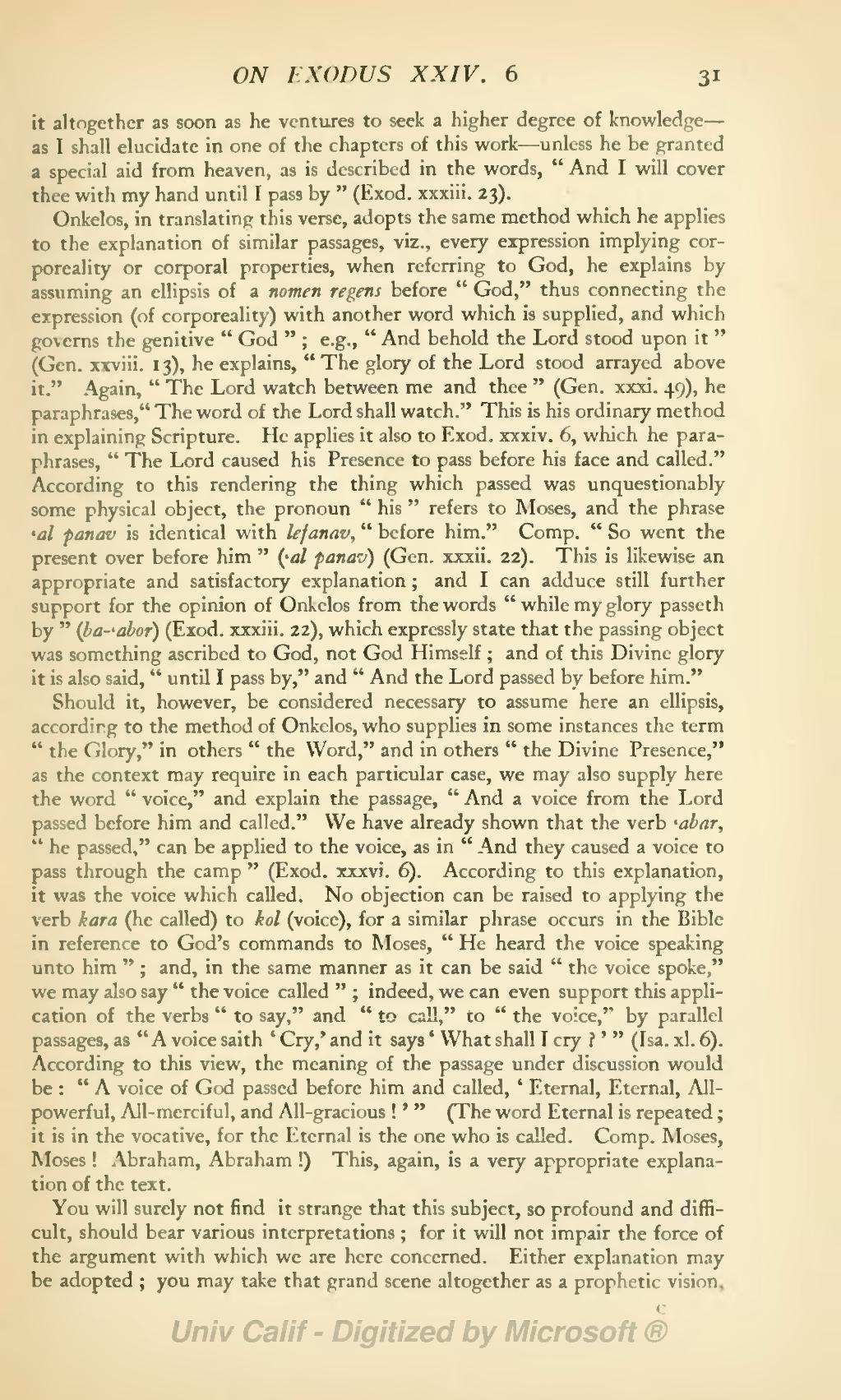altogether as soon as he ventures to seek a higher degree of knowledgeas I shall elucidate in one of the chapters of this work-unless he be granted a special aid from heaven, as is described in the words," And I will cover thee with my hand until I pass by" (Exod. xxxiii. 23)
Onkelos, in translating this verse, adopts the same method which he applies to the explanation of similar passages, viz., every expression implying corporeality or corporal properties, when referring to God, he explains by assuming an ellipsis of a nomen regens before" God," thus connecting the expression (of corporeality) with another word which is supplied, and which governs the genitive" God": e.g.," And behold the Lord stood upon it" (Gen. xxviii. 13), he explains," The glory of the Lord stood arrayed above it." Again," The Lord watch between me and thee" (Gen. xxxi. 49), he paraphrases," The word of the Lord shall watch." This is his ordinary method in explaining Scripture. He applies it also to Exod. xxxiv. 6, which he paraphrases," The Lord caused his Presence to pass before his face and called." According to this rendering the thing which passed was unquestionably some physical object, the pronoun" his" refers to Moses, and the phrase 'al panav is identical with lefanav," before him." Comp." So went the present over before him" ('al panav) (Gen. xxxii. 22). This is likewise an appropriate and satisfactory explanation: and I can adduce still further support for the opinion of Onkelos from the words" while my glory passeth by" (ba'abor) (Exod. xxxiii. 22), which expressly state that the passing object was something ascribed to God, not God Himself: and of this Divine glory it is also said," until I pass by," and" And the Lord passed by before him."
Should it, however, be considered necessary to assume here an ellipsis, according to the method of Onkelos, who supplies in some instances the term 44 the Glory," in others" the Word," and in others" the Divine Presence," as the context may require in each particular case, we may also supply here the word" voice," and explain the passage," And a voice from the Lord passed before him and called." We have already shown that the verb abar," he passed," can be applied to the voice, as in" And they caused a voice to pass through the camp" (Exod. xxxvi. 6). According to this explanation, it was the voice which called. No objection can be raised to applying the verb kara (he called) to kol (voice), for a similar phrase occurs in the Bible in reference to God's commands to Moses," He heard the voice speaking unto him": and, in the same manner as it can be said" the voice spoke," we may also say" the voice called": indeed, we can even support this application of the verbs" to say," and" to call," to" the voice," by parallel passages, as" A voice saith 'Cry,' and it says' What shall I cry? '" (Isa. xl. 6). According to this view, the meaning of the passage under discussion would be:" A voice of God passed before him and called, 'Eternal, Eternal, Allpowerful, All-merciful, and All-gracious!" ' (The word Eternal is repeated; it is in the vocative, for the Eternal is the one who is called. Comp. Moses, Moses! Abraham, Abraham!) This, again, is a very appropriate explanation of the text.
You will surely not find it strange that this subject, so profound and difficult, should bear various interpretations; for it will not impair the force of the argument with which we are here concerned. Either explanation may be adopted: you may take that grand scene altogether as a prophetic vision, and
